Poetry
Poetry
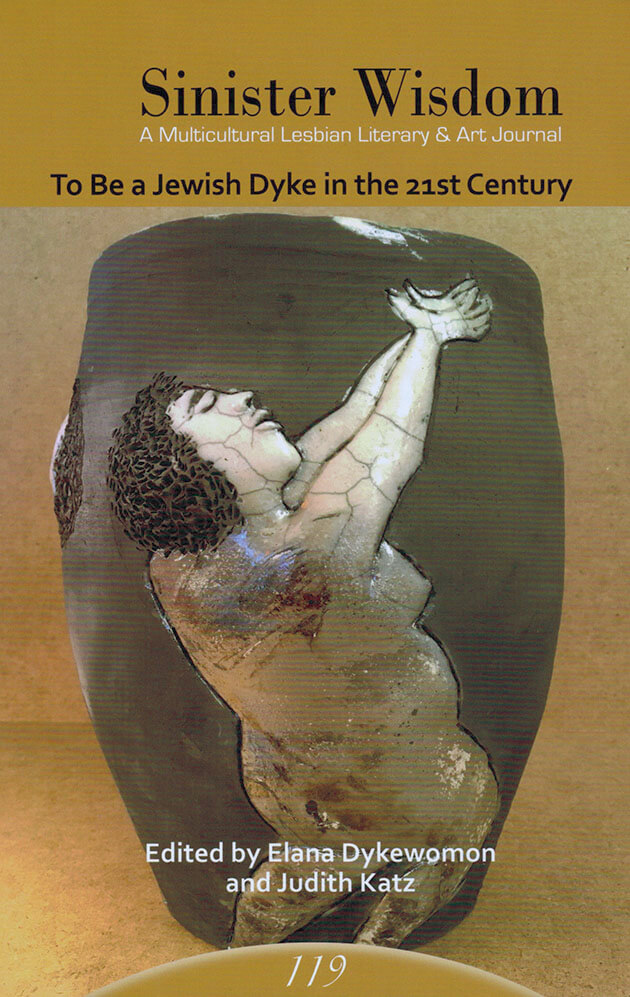
To Be a Jewish Dyke in the 21st Century
What are Jewish lesbians thinking about? Writing about? Making art about now, here in the first two decades of the 21st Century? Do we see ourselves as Jewish dykes? Jewish lesbians? Genderqueer Jews? How are we thinking about our Jewish lesbian communities and families, natal or invented? How have our relationships to the states of Israel and Palestine changed over time? Can we reconcile the contradictions between our faiths and our politics? Our gender and racial identities? How do we envision our futures and reimagine our pasts, especially in these fractious and dangerous times? One thing is certain. Our commitments to making trouble and speaking up are strong.
This issue of Sinister Wisdom: To Be a Jewish Dyke in the 21st Century, which takes its title from that life-giving stanza in Muriel Rukeyser’s epic poem “letter to the Front”, is a gathering of answers, challenges, and opinions directed at these and other questions.
Featuring work by
Yael Mishali
JEB (Joan E. Biren)
Terry Baum
Joan Larkin
Susan Sherman
Clare Kinberg
Irena Klepfisz
Nancy K Bereano
Penny Rosenwasser
Bonnie Morris
Jyl Lynn Felman
Marla Brettschneider
And more!
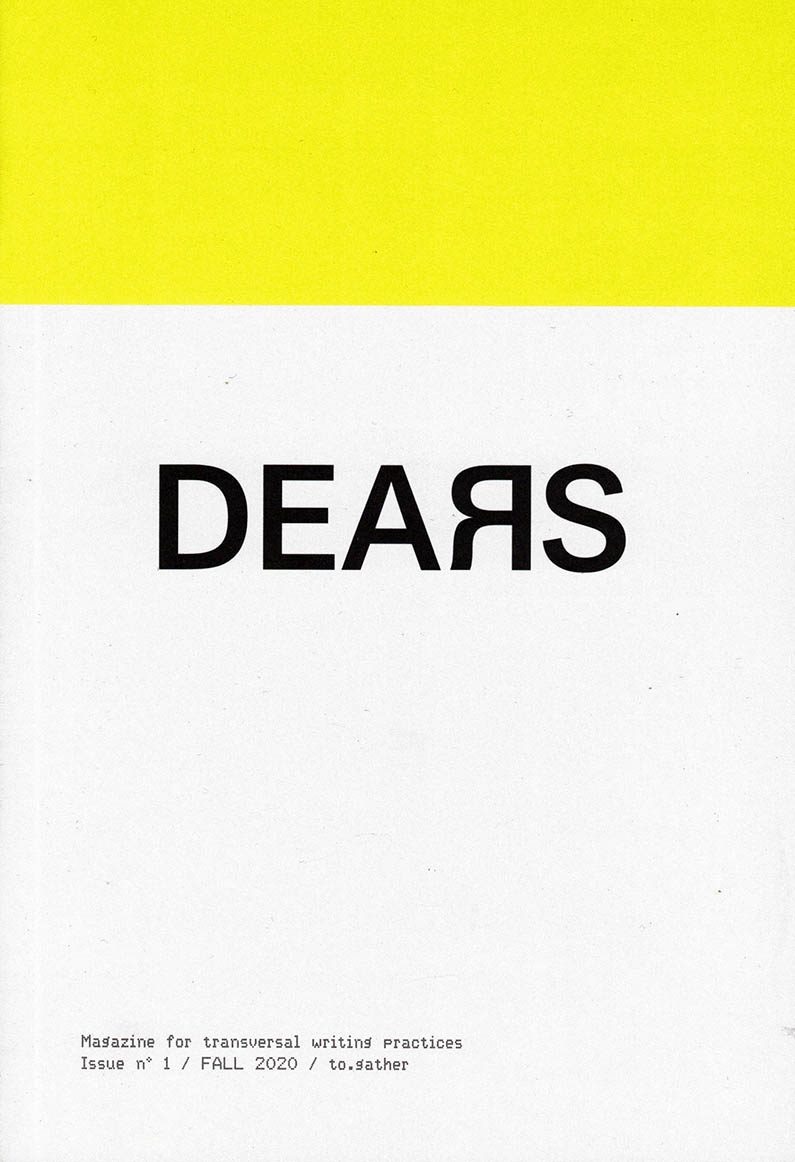
DEARS No. 1 TO.GATHER
Delphine Chapuis-Schmitz, Robert Steinberger and 1 more
DEARS Magazine on transversal writing, with texts by Season Butler, Crystal Z Campbell, Nicole Bachmann, Alessandro De Francesco, Benjamin Egger, Florinda Fusco, Gilles Furtwängler, Donna J. Haraway, Serafina Ndlovu, Rose Rand and Riikka Tauriainen.
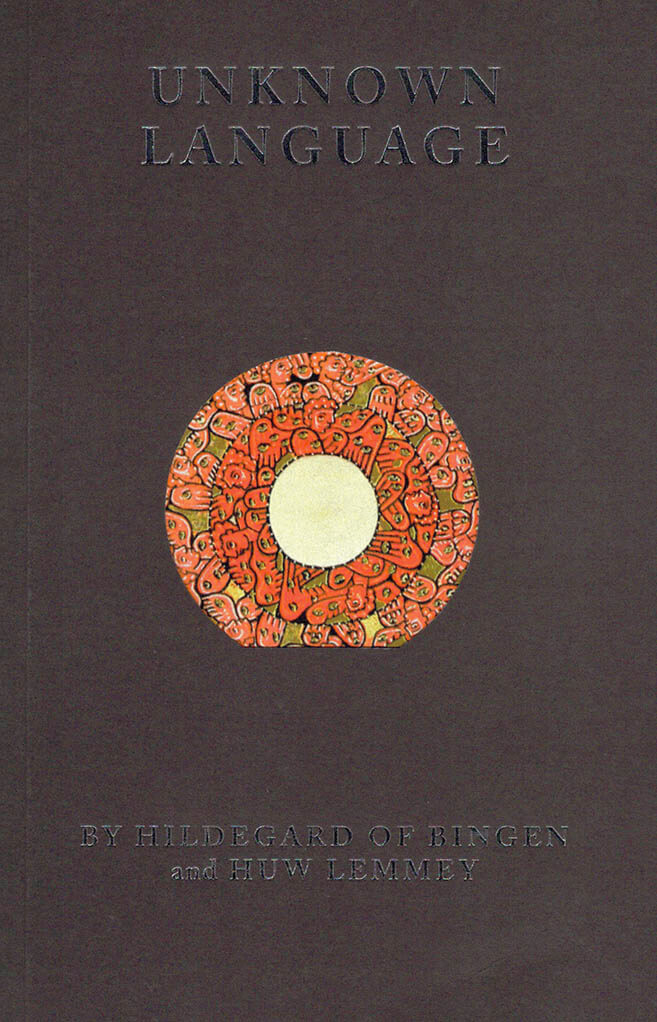
Unknown Language
Hildegard von Bingen, Huw Lemmey
Long, long before the Information Age ended, young Hildegard of Bingen finds beauty in the moral and spiritual ruins of her medieval world. In her forty-third year, she inscribes her cosmic visions into Scivias, an indescribably beautiful codex of writing and illuminations thought to be destroyed during the evacuation of Earth.
In a sea cave with cracked amethyst walls on Avaaz, Pinky Agarwalia discovers fragments of this visionary text containing hitherto unknown pathways to a lost vision of human co-existence with plants and non-humans - and the seeds of its rebirth on Avaaz.
Bursting with mythic quantum energy, Hildegard's vital linguistic potion viriditas, threaded throughout her communiqués, is a lush, verdant, renewable life-force. Her ecological message may be just the magic needed for rebirth on Avaaz. Hildegard's mystic toolkit for the future includes a cosmology, medicine, a morphology of crystals, recipes - and the symbols of a new language.
As Pinky Agarwalia traces the diagrams with her fingertip, she suddenly understands - a vision that appears without warning in her own mind - that she must first immerse these materials in water, a guarded substance. In the water, the molecules of the hidden language dissolve, freeze then reconfigure into new shapes, the crystalline language communicated not through sound but by feeling and light. Lingua Ignota, Hildegard's mysterious invented 'unknown language', arrives just in time for a world in flux, one whose coordinates are being recast.
Hildegard von Bingen (1098-1179), also known as Saint Hildegard and the Sibyl of the Rhine, was a German Benedictine abbess, writer, composer, philosopher, Christian mystic, visionary, and polymath. She is considered to be the founder of scientific natural history in Germany.
Huw Lemmey is a writer and publisher. He writes on culture, politics and sexuality, and is the author of the novels Chubz and Red Tory (Montez Press).

Glaring
Glaring: a sustained look of anger, an obvious fact, a situation of such brightness and intensity that vision is obscured. In his debut book of poems, Benjamin Krusling is concerned with reading domination and violence and entering their psychotic motion, the better to do otherwise. Through the thicket of anti-blackness, militarism, surveillance, impoverishment, and interpersonal abuse and violence, Glaring investigates the things that haunt daily life and make love difficult, possible, necessary.
Benjamin Krusling's Glaring is the winner of our 2019 Open Reading Period, and was selected by guest judge Lucy Ives.
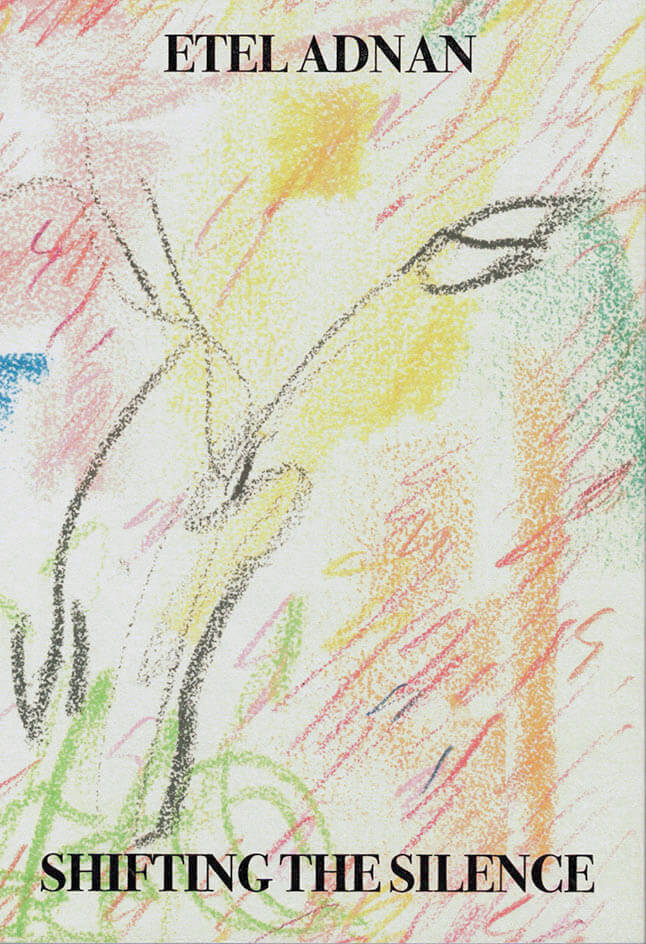
Shifting the Silence
A heart-rending meditation on aging, grief, and the universal experience of facing death.
Etel Adnan was born in Beirut, Lebanon in 1925. She studied philosophy at the Sorbonne, U.C. Berkeley, and at Harvard, and taught at Dominican College in San Rafael, California, from 1958-1972. In solidarity with the Algerian War of Independence (1954-1962), Adnan began to resist the political implications of writing in French and became a painter. Then, through her participation in the movement against the Vietnam War (1959-1975), she began to write poetry and became, in her words, "an American poet." In 1972, she returned to Beirut and worked as cultural editor for two daily newspapers—first for Al Safa, then for L'Orient le Jour. Her novel Sitt Marie-Rose, published in Paris in 1977, won the France-Pays Arabes award and has been translated into more than ten languages. In 1977, Adnan re-established herself in California, making Sausalito her home, with frequent stays in Paris. Adnan is the author of more than a dozen books in English, including Journey to Mount Tamalpais (1986), The Arab Apocalypse (1989), In the Heart of the Heart of Another Country (2005), and Sea and Fog (2012), winner of the Lambda Literary Award for Lesbian Poetry and the California Book Award for Poetry. In 2014, she was awarded one of France's highest cultural honors: l'Ordre de Chevalier des Arts et Lettres. Many of her poems have been put to music by Tania Leon, Henry Treadgill, Gavin Bryars, Zad Moultaka, Annea Lockwood, and Bun Ching Lam. Her paintings have been widely exhibited, including Documenta 13, the 2014 Whitney Biennial, CCA Wattis Institute for Contemporary Arts, The New Museum, and Museum der Moderne Salzburg. In 2014, Mathaf: Arab Museum of Modern Art mounted a retrospective of her work.
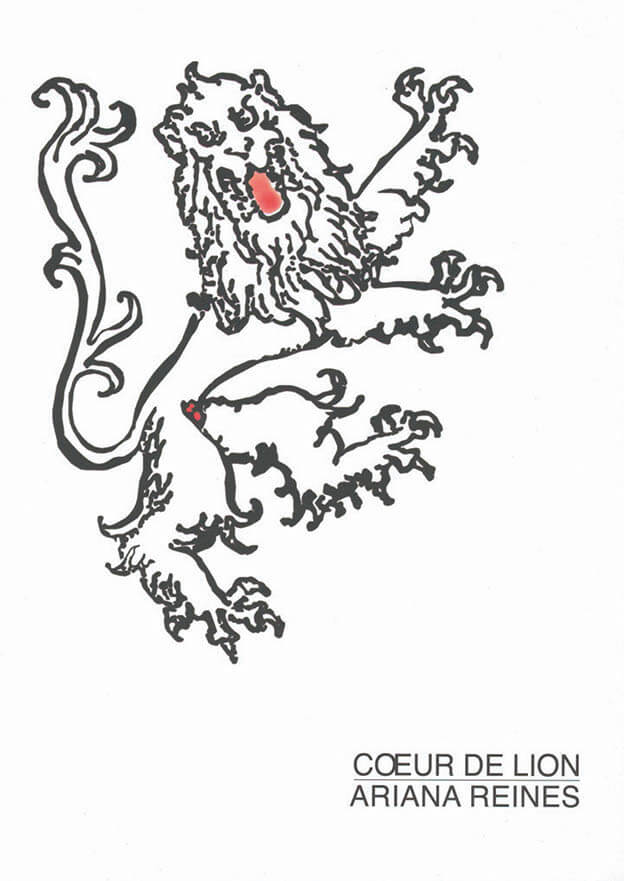
Coeur de Lion
A reissue of the instant cult-classic love poem, an investigation of poetic address.
Now that I am not addressing you
But the "you" of poetry
I am probably doing something horrible and destructive.
But this "I" is the I of poetry
And it should be able to do more than I can do.
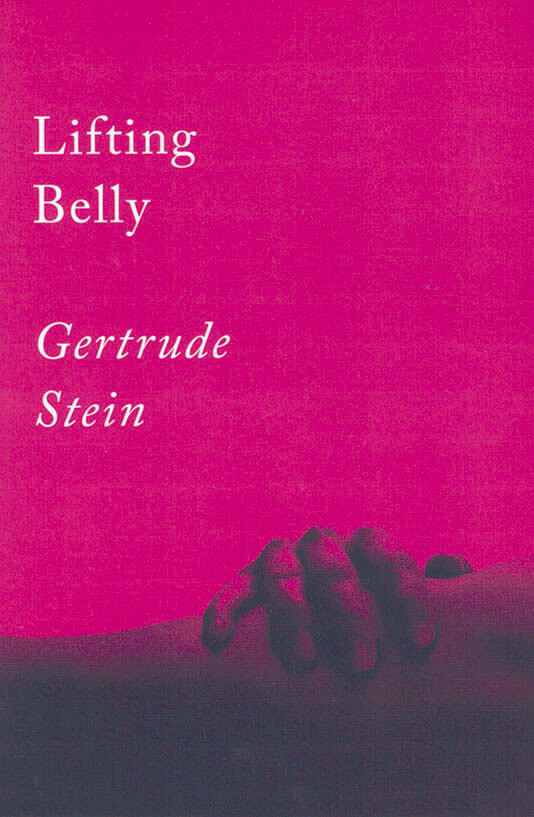
Lifting Belly: An Erotic Poem
Often considered the central erotic work of Stein's middle period, this love poem written to her longtime companion, Alice B. Toklas, reveals a vulnerability and tenderness unexpected of one so famous for caustic wit. Associative in structure, the work consists of alternately cryptic and conversational fragments detailing a shared domestic life. A very brief initial section observes the hardships of gay estrangement from society, while the body of the work applauds the decision to endure these for love's sake. Readers will welcome an unusual view of Stein in this work in which lifting belly, signifying sexual union, comes to imply passionate commitment to another and acceptance of oneself.
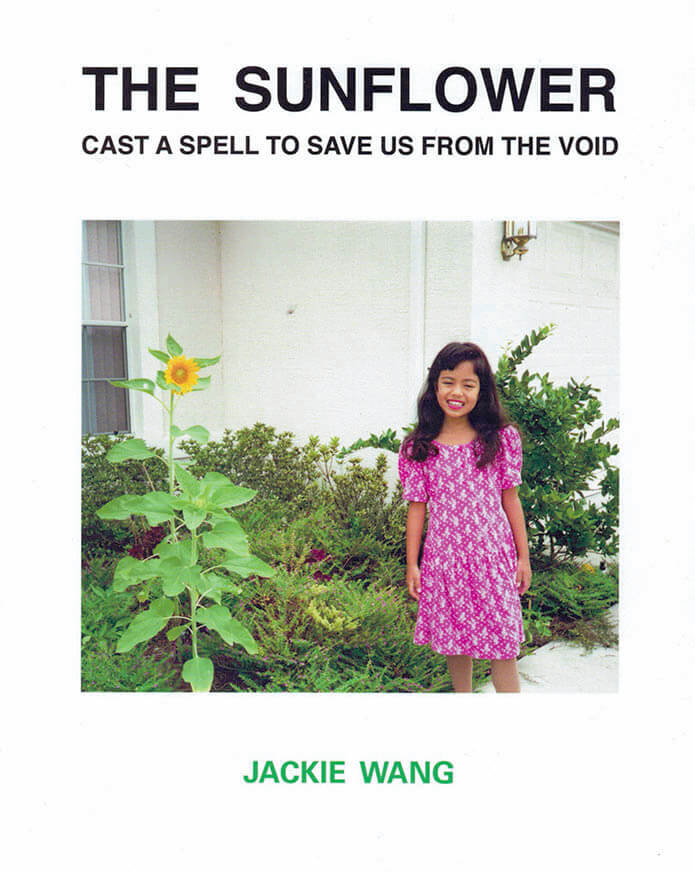
The Sunflower
Jackie Wang's magnetic and spellbinding debut collection of poetry that attempts to speak in the language of dreams.
The poems in The Sunflower Cast A Spell To Save Us From The Void read like dispatches from the dream world, with Jackie Wang acting as our trusted comrade reporting across time and space. By sharing her personal index of dreams with its scenes of solidarity and resilience, interpersonal conflict and outlaw jouissance, Wang embodies historical trauma and communal memory. Here, the all-too-familiar interplay between crisis and resistance becomes first distorted, then clarified and refreshed. With a light touch and invigorating sense of humor, Wang illustrates the social dimension of dreams and their ability to inform and reshape the dreamer's waking world with renewed energy and insight.
Jackie Wang is a student of the dream state, black studies scholar, prison abolitionist, poet, performer, library rat, trauma monster and PhD candidate in the Department of African and African American Studies at Harvard University, specializing in race and the political economy of prisons and police in the United States. She is the author of a number of punk zines including On Being Hard Femme, as well as a collection of dream poems titled Tiny Spelunker of the Oneiro-Womb. In 2018 she published a book, titled Carceral Capitalism on the racial, economic, political, legal, and technological dimensions of the US carceral state. She is currently an Arleen Carlson and Edna Nelson Graduate Fellow at the Radcliffe Institute for Advanced Study.
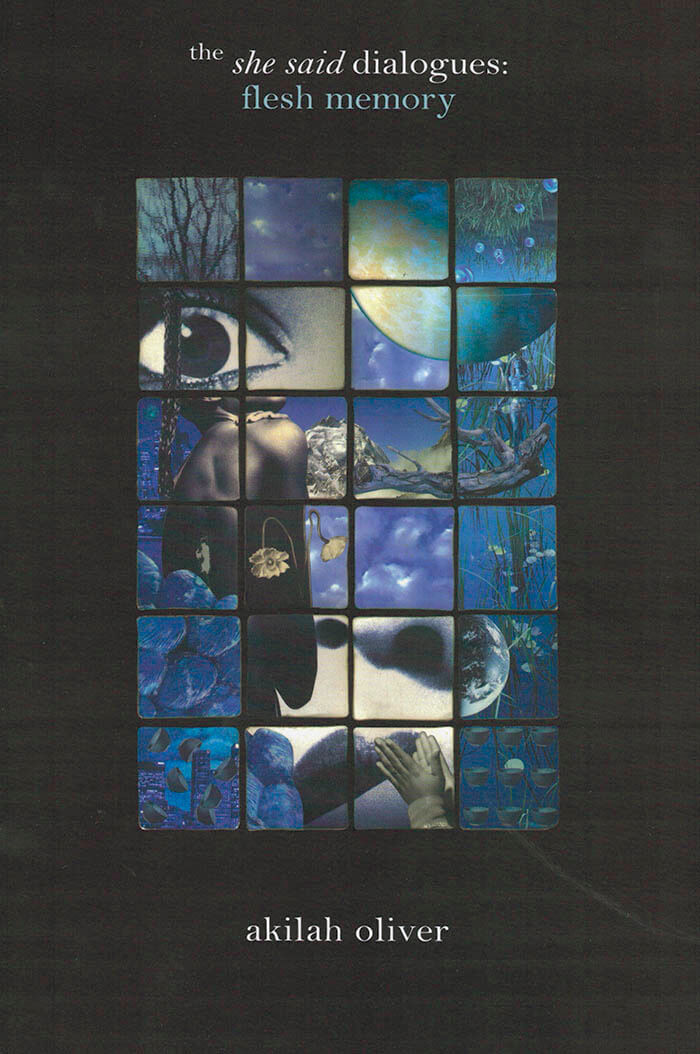
the she said dialogues
A reprint of the intersectional black feminist classic by the late poet and performer Akilah Oliver.
In her original author's note to the 1999 edition, Akilah Oliver writes,"What I am trying to do in these poems is investigate the non-linear synapses between desire, memory, blackness (as both a personal identity and a non-essentialist historical notion), sexuality and language." the she said dialogues: flesh memory proves to be not only still timely twenty years later, but essential reading for understanding intersectional politics and poetics in our current moment.
Akilah Oliver was born in St. Louis and grew up in Los Angeles. She was the author of two books of poetry: A Toast in the House of Friends (2009) and the she said dialogues: flesh memory (1999), which received a PEN Beyond Margins award. Her chapbooks include A Collection of Objects (2010), a(A)ugust (2007), The Putterer's Notebook (2006), and An Arriving Guard of Angels, Thusly Coming to Greet (2004). Oliver collaborated with a range of artists and musicians, such Tyler Burba, Anne Waldman, and Rasul Siddik; a notable performer, Oliver founded the feminist performance collective Sacred Naked Nature Girls in the 1990s. She was a member of the Belladonna* collaborative and a PhD candidate at the European Graduate School.

I Remember
Joe Brainard's I Remember is a literary and artistic cult classic, praised and admired by writers from Paul Auster to John Ashery and Edmund White. As autobiography, Brainard's method was brilliantly simple: to set down specific memories as they rose to the surface of his consciousness, each prefaced by the refrain "I remember": "I remember when I thought that if you did anything bad, policemen would put you in jail."
Brainard's enduring gem of a book has been issued in various forms over the past thirty years. In 1970, Angel Hair books published the first edition of I Remember, which quickly sold out; he wrote two subsequent volumes for Angel Hair, More I Remember (1972) and More I Remember More (1973), both of which proved as popular as the original. In 1973, the Museum of Modern Art in New York published Brainard's I Remember Christmas, a new text for which he also contributed a cover design and four drawings. Excerpts from the Angel Hair editions appeared in Interview, Gay Sunshine, The World and the New York Herald. Then in 1975, Full Court Press issued a revised version collecting all three of the Angel Hair volumes and added new material, using the original title I Remember. This complete edition is prefaced by poet and translator Ron Padgett.
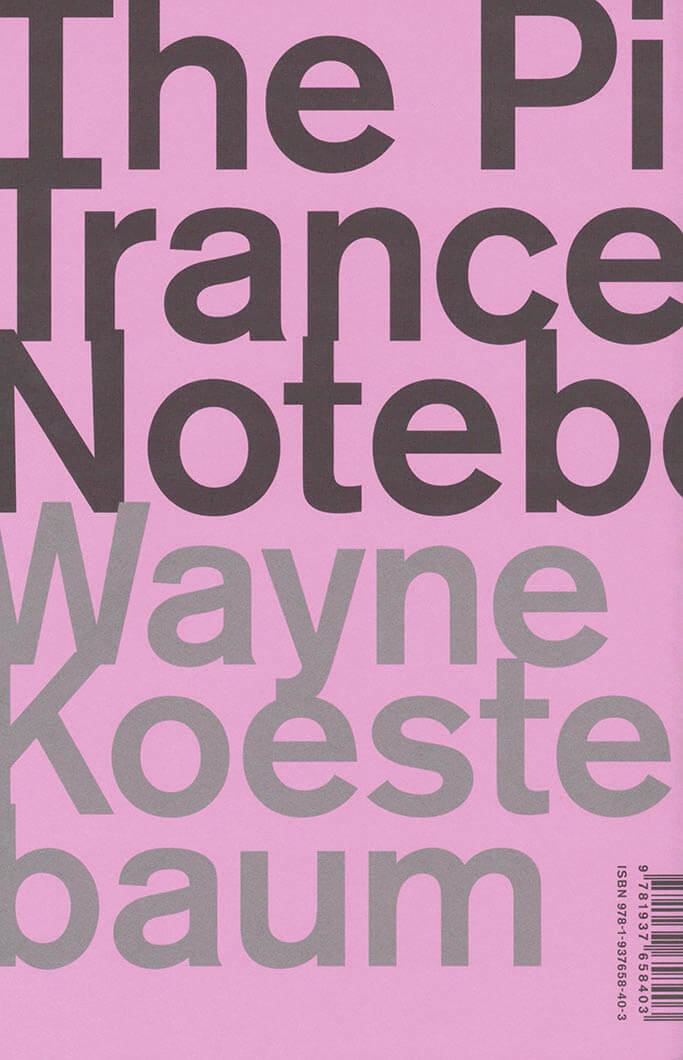
The Pink Trance Notebooks
The Pink Trance Notebooks is the product of the year Wayne Koestenbaum stopped keeping the traditional journal he had maintained for three decades and began a series of "trance notebooks" as a way to reflect an intensified, unmoored consciousness. The resulting sequence of 34 assemblages reflects Koestenbaum's unfettered musings, findings, and obsessions. Freed from the conventions of prose, this concatenation of the author's intimate observations and desires lets loose a poetics of ecstatic praxis—voiced with aplomb and always on point.
"Wayne Koestenbaum is one of the most original and relentlessly obsessed cultural spies writing today. His alarmingly focused attention to detail goes beyond lunacy into hilarious and brilliant clarity." —John Waters
WAYNE KOESTENBAUM is a poet and cultural critic. His recent books include My 1980s & Other Essays, Humiliation, The Anatomy of Harpo Marx, and the poetry collection Blue Stranger with Mosaic Background. He lives in New York City.
Published 2015.

The Cow
This text is filthy and fertilized, filling and emptying, filling and emptying, atrocious and politic with meaning. The Cow is a mother, a lover, and a murdered lump of meat, rendered in the strongest of languages. I cannot count the altering that happens in the very large rooms that are the guts of her.
To call Ariana Reines’ poetry scatological doesn’t even scratch the surface. “I COULD BE A DIAPER FOR THE DAY’S RESIDUALS,” she writes, and, “She clasped the event to her and proceeded. Fucked her steaming/ eyehole and ended it.” The Cow is a body in the way that texts are bodied—”Are you so intelligent your body doesn’t have you in it.”—but not in the way that allows the text to become desensitized, depersonalized, sterilized.
Winner of the 2006 Alberta Prize

The Undying (paperback)
Blending memoir with critique, an award-winning poet and essayist's devastating exploration of sickness and health, cancer and the cancer industry, in the modern world
A week after her 41st birthday, Anne Boyer was diagnosed with highly aggressive triple-negative breast cancer. For a single mother living payslip to payslip, the condition was both a crisis and an initiation into new ideas about mortality and the gendered politics of illness.
In The Undying - at once her harrowing memoir of survival, and a 21st-century Illness as Metaphor - Boyer draws on sources from ancient Roman dream diarists to cancer vloggers to explore the experience of illness. She investigates the quackeries, casualties and ecological costs of cancer under capitalism, and dives into the long line of women writing about their own illnesses and deaths, among them Audre Lorde, Kathy Acker and Susan Sontag.
Genre-bending, devastating and profoundly humane, The Undying is an unmissably insightful meditation on cancer, the cancer industry and the sicknesses and glories of contemporary life.
Winner of The Pulitzer Prize for Nonfiction 2020; Windham Campbell Prize for Nonfiction 2020

Calamities
A collection of linked essays concerned with the life and mind of the writer by one of the most original voices in contemporary literature. Each essay takes a day as its point of inquiry, observing the body as it moves through time, architecture, and space, gradually demanding a new logic and level of consciousness from the narrator and reader.
"Renee Gladman has always struck me as being a dreamer—she writes that way and the dreaming seems to construct the architecture of the world unfolding before our reading eyes."
—Eileen Myles
WINNER of the 2017 Firecracker Award for Nonfiction from the Community of Literary Magazines and Presses (CLMP).
Renee Gladman is a writer and artist preoccupied with lines, crossings, thresholds, geographies, and syntaxes as they play out in the interstices of poetry and prose. She is the author of ten published works, including a cycle of novels about the city-state Ravicka and its inhabitants, the Ravickians; Calamities, a collection of linked essays on writing and experience, which won the 2017 Firecracker Award in Nonfiction; and a monograph of ink drawings, Prose Architectures. She lives in New England with poet-ceremonialist Danielle Vogel.
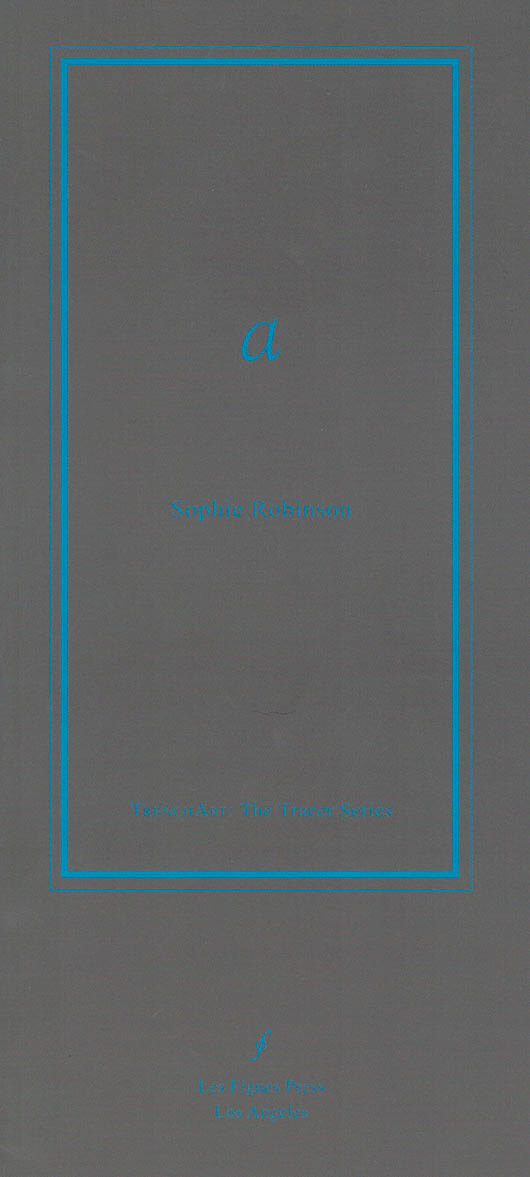
A (Trenchart)
How do you trace death? What do you make of the useless objects left behind? Conjuring Cage, Stein, and Francesca Woodman, British poet Sophie Robinson documents the detritus of sudden loss. Layering word and image, object and subject, the said with the unsayable, A is as Caroline Bergvall writes, "[a] work of mourning. Angry, torn, hardly daring to remember", a textual performance of "love that dares to speak as queer."
A is published as part of the TrenchArt: Tracer Series, with a foreword by Caroline Bergvall, an afterword by Diane Ward, and collaborative visual art by Ken Erhlich and Susan Simpson.

Hannah Weiner's Open House
Hannah Weiner's Open House beckons us into a realm of poetry that bends consciousness in order to open the doors of perception. Weiner is one of the great American linguistic inventors of the last thirty years of the 20th century. She created an alchemical poetry that transforms the materials of everyday life into a dimension beyond sensory perception. The pieces collected here are as much conceptual art as sprung prose, experimental mysticism as social realism, autobiography as egoless alyric. Patrick Durgin has brought together touchstone works, some familiar and some never before published. Hannah Weiner's Open House provides the only single volume introduction to the full range of Weiner's vibrant, enthralling, and unique contribution to the poetry of the Americas. (Charles Bernstein)
Hannah Weiner's influence extends from the sixties New York avant-garde, where she was part of an unprecedented confluence of poets, performance and visual artists including Phillip Glass, Andy Warhol, Carolee Schneeman, John Perrault, David Antin, and Bernadette Mayer. Like fellow-traveler Jackson Mac Low, she became an important part of the Language movement of the 70s and 80s, and her influence can be seen today in the so-called New Narrative work stemming from the San Francisco Bay Area.
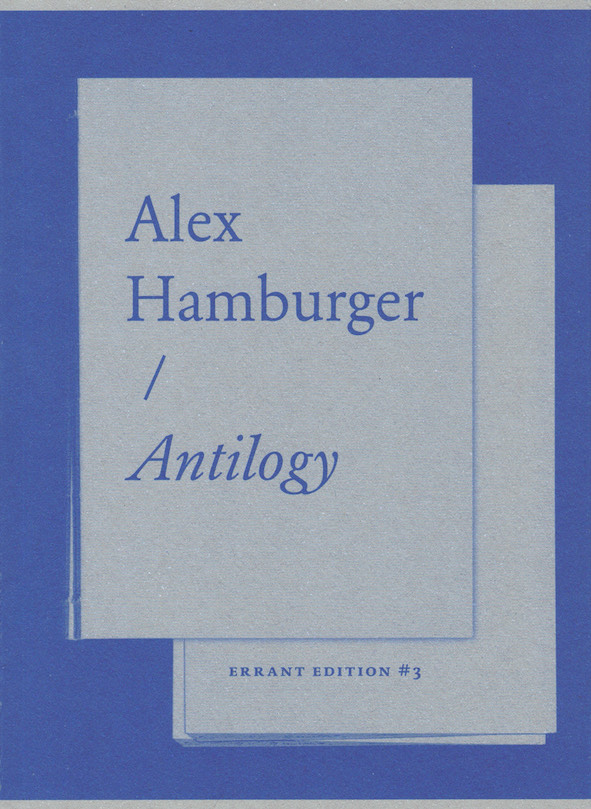
Antilogy
Drawing from notions of "bad poetry" as the critical undoing of normative taste, Antilogy brings together works by the Brazilian artist and poet Alex Hamburger.
Central to Hamburger's practice and engagement with poetry is a focus on writing as the expression of a performative disruption and playful reworking of semiotic systems. With references to Fluxus intermediality, Brazilian concretism, experimental music, and sound poetry, Hamburger's work dynamically collapses the distinctions between fact and fiction, theory and performance, system and noise. From visual poems to abstract narrative to personal fantasy, Antilogy reminds us about the potent sense of refusal and experimentation that all art should carry.
Alex Hamburger was born in Belgrade, Serbia, in 1948. From the 80s onward his researches and proposals turned to the possibilities of fusion and intertwining of languages, developing works in Verbal, Visual and Sound Poetry, Object-Poem, Artist's books, Installation, Performance art, etc. He has published seven books in various poetical genres, three CDs of Sound Poetry and has performed several performance pieces, some in partnership with the visual artist Marcia X, with whom he established a fruitful relationship throughout the 80s, contributing decisively for a better understanding and acceptance of the above practices in the local art circuit of Rio de Janeiro. His work is held in the collections of contemporary art institutions, in Brazil and abroad, including The Museum of Modern Art, RJ, The Museum of Modern Art, SP, Printed Matter Bookstore, New York, Compendium of Contemporary Fine Prints, Hamburg, ICA, London among others. Alex Hamburger continues to live and work in Rio de Janeiro, Brazil.
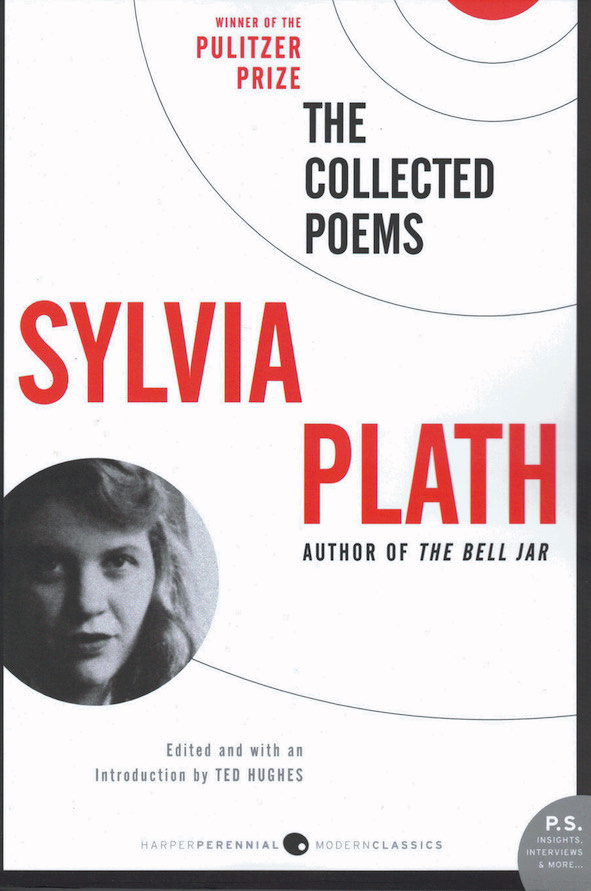
Sylvia Path: Collected Poems
Pulitzer Prize winner Sylvia Plath's complete poetic works, edited and introduced by Ted Hughes.
By the time of her death on 11, February 1963, Sylvia Plath had written a large bulk of poetry. To my knowledge, she never scrapped any of her poetic efforts. With one or two exceptions, she brought every piece she worked on to some final form acceptable to her, rejecting at most the odd verse, or a false head or a false tail. Her attitude to her verse was artisan-like: if she couldn't get a table out of the material, she was quite happy to get a chair, or even a toy. The end product for her was not so much a successful poem, as something that had temporarily exhausted her ingenuity. So this book contains not merely what verse she saved, but after 1956 all she wrote.
(Ted Hughes, from the Introduction)
Sylvia Plath was born in 1932 in Massachusetts. Her books include the poetry collections The Colossus, Crossing the Water, Winter Trees, Ariel, and Collected Poems, which won the Pulitzer Prize. A complete and uncut facsimile edition of Ariel was published in 2004 with her original selection and arrangement of poems. She was married to the poet Ted Hughes, with whom she had a daughter, Frieda, and a son, Nicholas. She died in London in 1963.
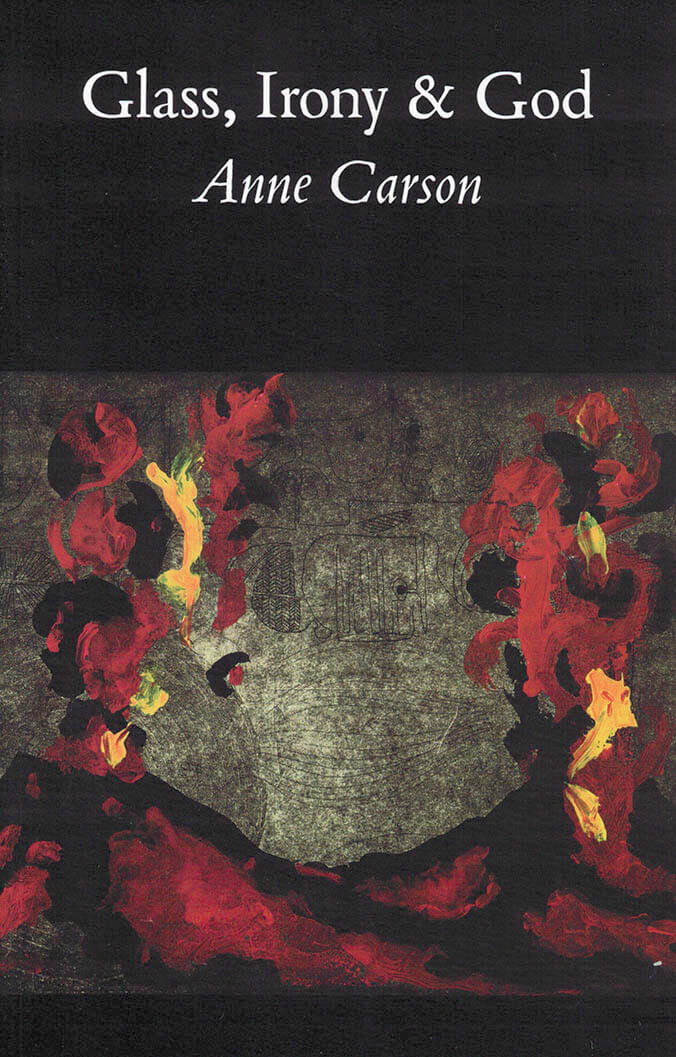
Glass, Irony & God
Known as a remarkable classicist, Anne Carson weaves contemporary and ancient poetic strands with stunning style in Glass, Irony and God. This collection includes: "The Glass Essay," a powerful poem about the end of a love affair, told in the context of Carson's reading of the Bronte sisters; "Book of Isaiah," a poem evoking the deeply primitive feel of ancient Judaism; and "The Fall of Rome," about her trip to "find" Rome and her struggle to overcome feelings of a terrible alienation there.
Anne Carson was born in Canada and teaches ancient Greek for a living.

the monumental mismemberings
the monumental misrememberings is a meditation on death. It’s a curious insight on the creative and violent ways in which Black girls, women, trans women and femmes often become displaced, experience death, and subjugation as a result of patriarchal systems in America. This debut collection of poems by Mimi Tempestt operates through this specific lens, not to romanticize the pain of Black femme bodies, but to bring light to this sadistic truth. When we turn on the television, when we log into social media, when we look in the mirror, the normalcy of how often and creatively Black women are murdered weighs on our conscience. the monumental misrememberings addresses our unwillingness to grapple with these violences, and places front and center the realities faced by Black femmes.
Size: 5" x 7.5", 88 pages
Self published by Co—Conspirator Press with the support of Women's Center for Creative Work. Designed by MJ Balvanera, Riso-printed by Neko Natalia.

The Nancy Reagan Collection
THE NANCY REAGAN COLLECTION is a response to growing up queer and trans under the rise of HIV-AIDS. Crossing genres and generations, this performance novel remixes the AIDS archive through an ever-spiraling politics and aesthetics of mourning. Alternating chapters offer up a narrative throughline composed of hallucinogenic episodes from the perspective of a nameless, grieving protagonist in the midst of the global carnage of the Reagan dynasty. Part revenge, part fantasy, the book experiments with poetic practices that challenge conceptions of memory and morality, activism and escapism, grief and beauty.
Maxe Crandall is a poet, playwright, and director. He is the author of the chapbooks Emoji for Cher Heart (Belladonna*, 2015) and Together Men Make Paradigms (Portable Press @ Yo-Yo Labs, 2014), and is the founder of the theater company Beautiful Moments in Popular Culture, which produces a poets theater series at the Stud in San Francisco. He has received fellowships from the Poetry Project, Poets House, Lambda Literary, and the Millay Colony for the Arts. Maxe is a lecturer in the Feminist, Gender, and Sexuality Studies Program at Stanford University.

Being Human Is an Occult Practice
In the essay BEING HUMAN IS AN OCCULT PRACTICE, Zurawski argues that studying and sharing literature can function as a means of enriching the impoverished definition of human created by capitalist social relations. Beginning with an analysis of Robert Duncan's description of the moment in his high school classroom when he finds himself called into a life in poetry, this essay explores the possibilities of the literature classroom at the very moment that it's being dismantled by the neoliberalization of our university systems. Zurawski argues that the literary holds a revitalizing potential precisely because of its capacity of exceeding the narrow imaginative aims of life within our contemporary social order.
Magdalena Zurawski is the author of BEING HUMAN IS AN OCCULT PRACTICE (Ugly Duckling Presse, 2020), the novel The Bruise, which won the Ronald Sukenick Award from FC2 in 2008 and a LAMBDA literary award in 2009, and the collection of poems COMPANION ANIMAL, which was published by Litmus Press in 2015 and won a Norma Faber First Book Award from the Poetry Society of America. THE TINIEST MUZZLE SINGS SONGS OF FREEDOM (Wave Books, 2019) is her most recent poetry collection. Her poem/essay Don't Be Scared is available as a chapbook from The Operating System. As an undergraduate Magdalena studied with poets Rosmarie and Keith Waldrop, C.D. Wright, and Peter Gizzi. She has lived in Berlin, New York, Philadelphia, San Francisco, and Durham, NC where she ran the Minor American Reading Series. She is currently Associate Professor of English and Creative Writing at the University of Georgia, where she directs the Creative Writing Program.

The First Books of David Henderson and Mary Korte: A Research
In 1967, the first books of two poets were published by small presses on opposite coasts of the USA: David Henderson's Felix of the Silent Forest and Mary Norbert Korte's Hymn to the Gentle Sun. In this essay, poet, scholar, educator, and publisher Iris Cushing looks at the context of these supposedly minor poets, and through research and conversation with Korte, Henderson, and Diane di Prima, reconstructs the role of small presses in the countercultural resistance of the late 1960s.
Iris Cushing is a poet, scholar, educator and founding editor for Argos Books, an independent poetry press. She is the author, most recently, of THE FIRST BOOKS OF DAVID HENDERSON AND MARY NORBERT KORTE: A RESEARCH (Ugly Duckling Presse, 2020), and Into the Long Long Time: How Mary Korte Saved the Trees (Ink Cap Press, 2019). Her poems and critical writings have appeared in numerous publications, including the Boston Review, Fence, and the Academy of American Poets Poem-A-Day series, and her poetry collection WYOMING (Furniture Press Books, 2014) won the 2013 Furniture Press Poetry Prize. She has edited three chapbooks for the Lost & Found Poetics Documents Initiative: Diane di Prima: Prometheus Unbound as a Magickal Working (Series VIII, 2019), Bobbie Louise Hawkins: The Sounding Word, and Judy Grahn: Selections from Blood, Bread and Roses (Series VI, 2016). A doctoral candidate in English at the CUNY Graduate Center, Iris is currently at work on a biographical dissertation titled Pierce and Pine: Diane di Prima, Mary Norbert Korte and the Question of Matter and Spirit.
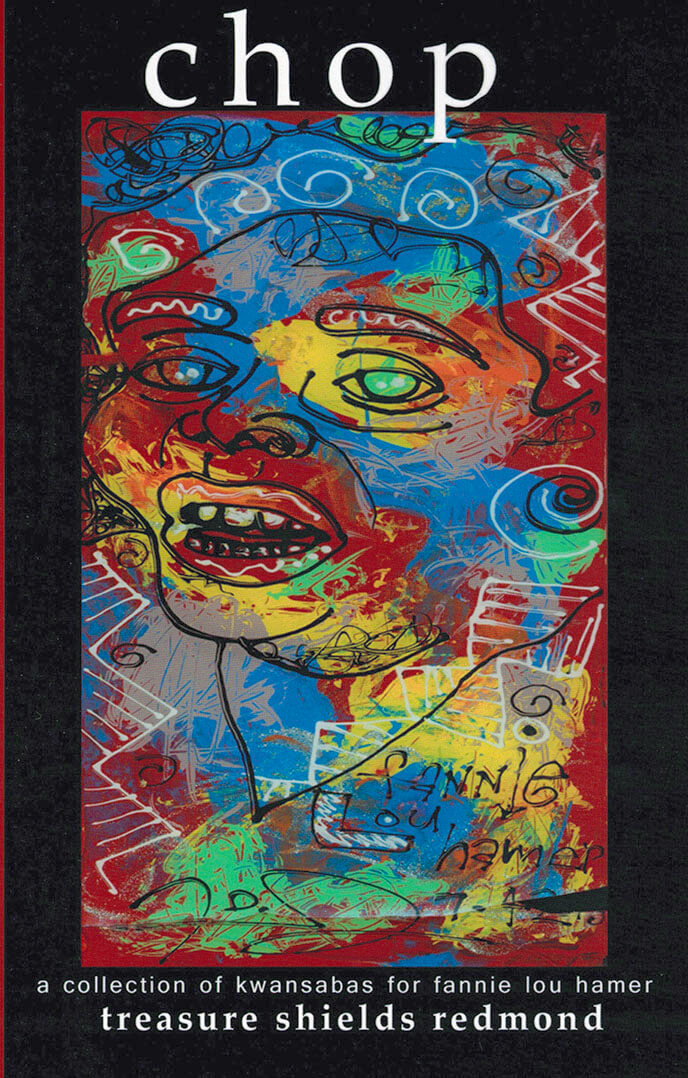
chop: a collection of kwansabas for fannie lou hamer
chop is a collection of poems that center on the life and work of proto-feminist and civil rights activist, Fannie Lou Hamer.
A Mississippi native, Treasure Shields Redmond is a poet, speaker, diversity and inclusion coach, and social justice educator. In 2016 she founded her company, Feminine Pronoun Consultants, LLC. Even though Treasure is completing a PhD in English Literature and Criticism, is a published writer, gifted veteran educator, and has spoken on stages all over the U.S. and in Europe, she uses her humble beginnings in the federal housing projects in Meridian, Mississippi to fuel her passion for helping college-bound families navigate college admissions painlessly and pro tably, and o ering perceptive leaders creative diversity and inclusion facilitation. Additional information on her poetry, writing, and multidimensional practice are available at: www.FemininePronoun.com.